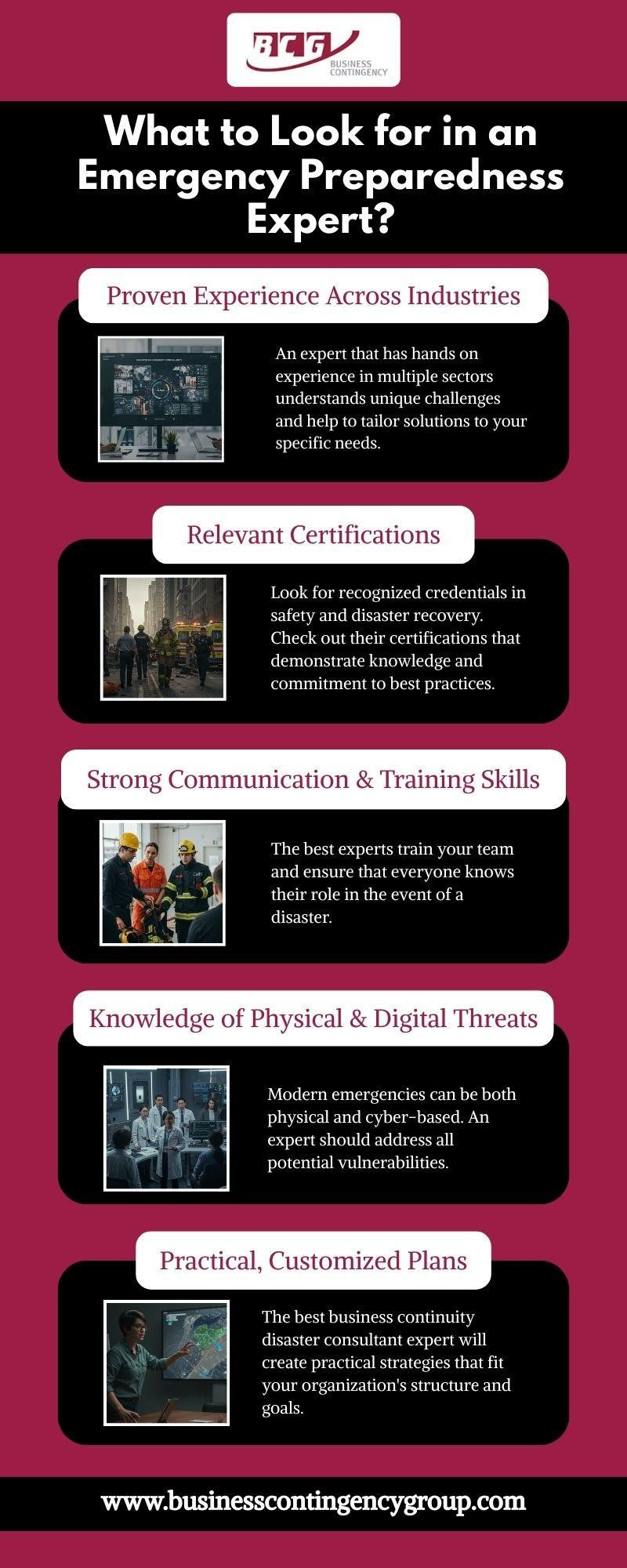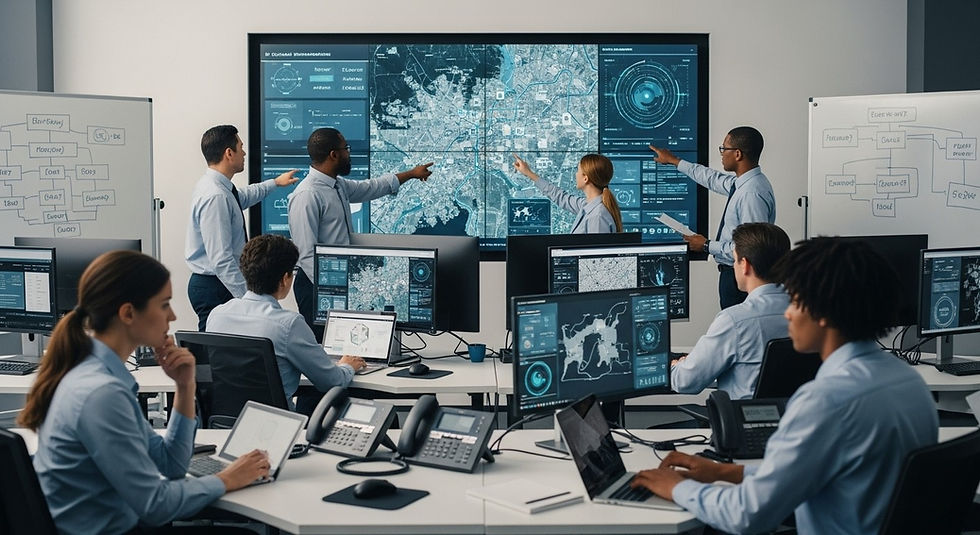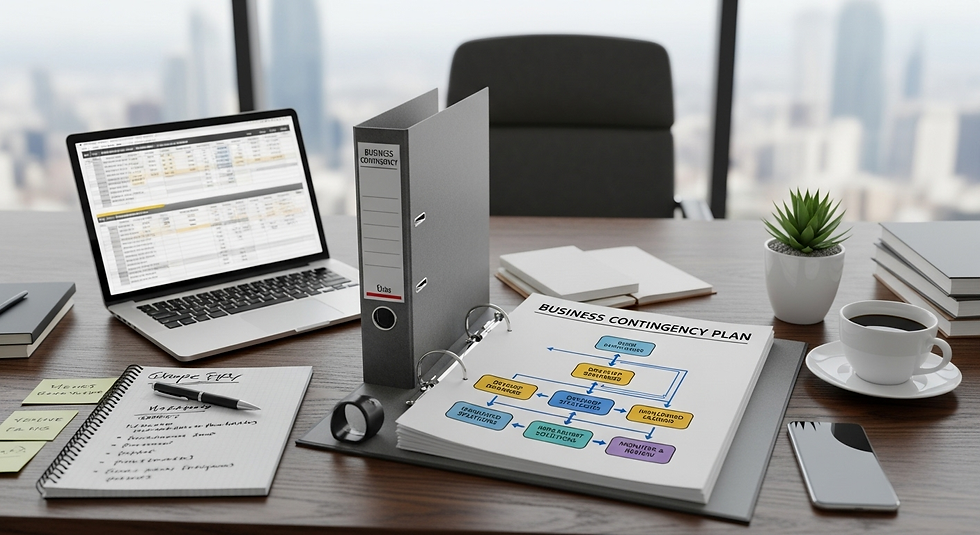When to Hire an Emergency Preparedness Planning Expert
- rebekahh84
- Aug 28, 2025
- 5 min read
A poorly managed emergency can disrupt the operations of any business and leave it in an increasingly competitive marketplace.
Businesses can face unexpected crises that can strike at any moment. They assume they are prepared, but they realize their plans are incomplete and outdated.
A business needs to have a clear plan in place to address emergencies and occupational health hazards. You may find out the hazardous conditions that would leave you in an emergency situation, so that you can eliminate them.
It is where emergency management consulting becomes essential. These professionals help safeguard businesses before disaster strikes. In this blog, we'll explore when it's the right time to bring in an expert to strengthen your preparedness plan.
Why Have an Emergency Plan?
A clear emergency plan is a vital part of any occupational health and safety program. The primary purpose of it is to provide clear guidance during unexpected crises.
Developing an emergency plan often uncovers hidden hazards that could worsen a crisis. Organizations can take proactive steps to eliminate them by identifying these risks early. The planning process also highlights gaps such as
Insufficient equipment
Limited supplies
Lack of trained personnel
These issues can be corrected before they escalate into real threats. The act of planning raises safety awareness across the workplace and demonstrates the commitment of the organization to protecting its employees.
The consequences can be devastating without a proper emergency plan. The absence of a structured response can lead to confusion, poor judgment, and severe losses.
The Role of an Emergency Preparedness Planning Expert
It is important to understand what these experts do before diving into when to hire one. An emergency preparedness planning expert is trained to:
Conduct risk assessments to identify potential threats.
Develop comprehensive emergency response plans tailored to an organization's size and operations.
Train employees to respond calmly and effectively under pressure.
Ensure compliance with regulatory and industry standards.
Coordinate with local emergency services and government agencies.
Establish a business continuity plan to minimize downtime and financial losses.
They make sure that your business is not just reactive but proactively resilient.

When to Hire an Emergency Preparedness Planning Expert
1. When Compliance Demands It:
Having a comprehensive preparedness plan is mandatory in many industries. Regulatory bodies such as the federal state require organizations to have emergency procedures that will protect employees and customers. Here are some of the industries that require an emergency and disaster consulting services.
· Healthcare facilities
· Educational institutions
· Manufacturing and industrial sectors
When you bring in an emergency preparedness planning expert, it ensures that your organization is not only compliant but also well prepared beyond the minimum legal standards. Experts understand the complexities of various industry regulations and can design tailored plans that:
· Meet or exceed compliance requirements.
· Provide thorough documentation for audits and inspections.
· Reduce the risk of fines, lawsuits, or forced closures.
· Demonstrate organizational accountability and commitment to safety.
2. To Facilitate Meaningful Community Engagement
Every community has its unique needs and those needs shape how the recovery will take place. Any plan that is developed in isolation often misses the crucial perspective. That is why it is important to engage residents and the local community.
These experts know the community concerns and their strengths. These engagements ensure that the plan reflects the real needs of people.
This dialogue fosters trust and collaboration that is crucial for resilience when disaster strikes and recovery begins.
3. To Assign the Right Responsibilities to the Right People
There has been a successful coordination among multiple players such as
· Local government
· Healthcare professionals
· Schools
· Emergency services
· Community Organizations
There can be chaos without clarity on who is responsible for what.
Emergency preparedness experts help to find out the key stakeholders and assign them clear roles within the disaster management framework. They help to set up recovery coordination centers and create communication networks that simplify collaboration during a crisis.
Communities are better equipped to respond quickly and effectively by establishing these partnerships and responsibilities.

4. To Guide through the Complexities of Different Disasters
No two disasters are exactly alike. Floods, wildfires, cyberattacks, and pandemics all carry unique challenges that require specialized strategies. Planning without prior knowledge or experience can leave gaps that only become apparent in the middle of a crisis.
Emergency preparedness and disaster management consultancy experts bring hands on experience with diverse communities facing a wide range of disasters. They also stay up to date with evolving industry practices to ensure that your preparedness plan is built on innovative strategies.
Communities can develop a flexible disaster recovery framework with their guidance. One that provides a strong general structure while still being adaptable to different types of emergencies.
5. If Employees Feel Unprepared
An emergency plan would not protect anyone when the real crisis strikes. The effectiveness and preparedness strategy depends on how well employees understand it and how they can act under pressure.
That is why it is important to have an emergency preparedness planning expert. These professionals not only bring technical knowledge but also help the employees know what to do in critical moments.
These experts can:
Run interactive drills and simulations for scenarios like fires, active threats, or cyber incidents. These exercises help employees practice responses in realistic conditions.
Offer role specific training to help managers and front line workers all understand their responsibilities and avoid duplicating efforts or leaving gaps.
Evaluate employee performance during drills, identifying where confusion or hesitation arises and addressing those weaknesses before a real emergency.
Build confidence through repetition, ensuring that actions become second nature, even in stressful situations.
Training also strengthens communication and teamwork. Clear coordination in emergencies can be the difference between order and chaos. Preparedness experts foster a culture where employees trust one another and understand that safety is everyone's responsibility.
6. To Secure Funding and Build Aid Partnerships
Even the best preparedness plans require resources to put into action. Unfortunately, many communities struggle to secure the funding or aid needed for effective recovery.
Preparedness experts often have established connections with relief agencies, non profits and funding providers.
They can support grant applications by identifying needs, framing strong proposals, and highlighting potential outcomes to increase the chances of approval.
Experts also help build partnerships with organizations like the Red Cross or other humanitarian groups to ensure that communities have reliable aid partners when disaster strikes.
Conclusion:
Preparedness is not only about resilience but also about competitive advantage. Though hiring a business continuity disaster consultant is often seen as a defensive move but it protects you against what might go wrong.
Every emergency exposes the strengths and weaknesses of an organization. Preparedness is not just about avoiding chaos but also about building resilience as a competitive advantage.
If you are ready to take the next step in strengthening your preparedness strategy check out the expert services by Business Contingency Group and ensure your organization is ready for whatever the future brings.




Comments